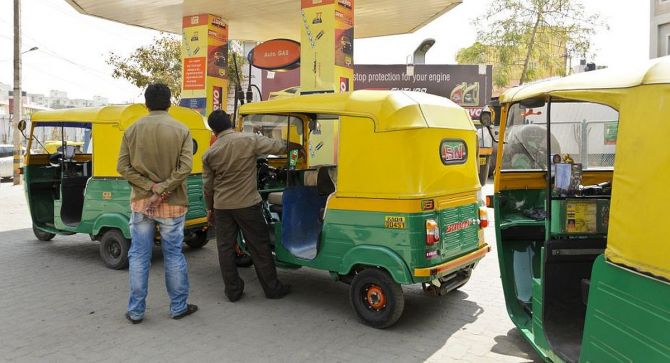Amid a shift in mobility trends and people increasingly opting for less polluting energy sources, sales of compressed natural gas (CNG) vehicles increased more than 82 per cent in the past five years.

A total of 729,902 CNG vehicles were sold in 2022-23 against 400,825 in 2017-18, according to VAHAN Dashboard.
Though the increase in sales of CNG-powered vehicles has been significant, their share in overall vehicle sales remains minuscule as is the case with EVs.
Of total 22,224,702 vehicles sold in India in FY23, the share of CNG vehicles stood at just 3.28 per cent.
The share of CNG automobiles in the four-wheeler category has more than doubled since in the past five years — from 4.73 per cent in FY18 to 9.06 per cent in FY23.
The share of petrol vehicles in the overall four-wheeler sales also increased to 41 per cent in FY23, from 35 per cent in FY18.
However, the pie of diesel shrunk to 41 per cent in FY23, from 55 per cent in FY18.
The share of EVs, too, increased to 5.3 per cent in FY23 in total vehicle sales from 0.40 per cent in FY18.
However, electric four-wheeler sales were around 4 per cent of the overall EV sales.
A total of 49,822 electric four-wheelers were sold in FY23, against 2,714 sold in FY18.
Though customers increasingly opted for greener and cleaner vehicles in the past five years, the share of petrol and diesel automobiles still remains significantly higher despite a decline of 13 per cent and 18 per cent, respectively.
In 2023, the share of petrol and diesel vehicles was 78 per cent and 10 per cent, respectively, according to the VAHAN data.
The shift
Lower cost of operation compared to cars run on diesel and petrol, new launches, and higher cash incentives are powering the rising demand for CNG vehicles, experts said.
“The running cost of CNG is around Rs 2.5 per km as against Rs 5.30 for petrol and diesel vehicles; major brands have stopped producing diesel variants,” experts said.
India’s biggest carmaker Maruti Suzuki has completely discontinued diesel models. Tata Motors, too, has discontinued smaller-capacity diesel engines and Honda India recently said it would most likely discontinue its diesel-engine cars.
Hyundai also discontinued the diesel variant in the recently launched Verna 2023.
Moreover, there is rising interest in electric vehicles (EV); the segment is fast gaining traction with the government’s focus on environment-friendly, self-manufactured and sustainable solutions.
The NITI Aayog has set a target of EV sales penetration at 70 per cent for all commercial cars, 30 per cent for private cars, 40 per cent for buses, and 80 per cent for two- and three-wheelers by 2030.
Apart from the stricter emission norms, the surge in electric vehicle sales has spelled doom for diesel engine cars.
The narrowing down of petrol and diesel prices over the last few years has further reduced diesel cars’ appeal.
“With CNG one gets more mileage against gasoline.
"CNG is gaining traction in not just commercial but also in personal mobility. Brands are coming up with their CNG models across segments,” said Puneet Gupta, director, S&P Global.
As people are becoming environmentally conscious, they are preferring CNG as opposed to petrol and diesel.
Some auto companies are also pushing CNG penetration as they believe that CNG is a perfect transition between the gasoline and the electric vehicles eras, Gupta said.
The challenge
The rising cost of CNG and lack of fuel stations are hampering growth of the CNG segment.
CNG cars largely dominate the taxi segment in cities and commercial vehicles.
There were 4,679 CNG pumps across Indian cities as of October 2022, up from 900 in 2014.
The price of CNG has more than doubled in Delhi to Rs 79.56 per kg in 2023, from Rs 37.65 per kg in 2017.
It is even higher in other states.
“Growth in CNG is because of the mileage factor.
"The fuel cost is almost equal in a majority of states, which impacts sales,” said an expert.
OEMs are also investing in alternate technologies, such as hydrogen fuel.











